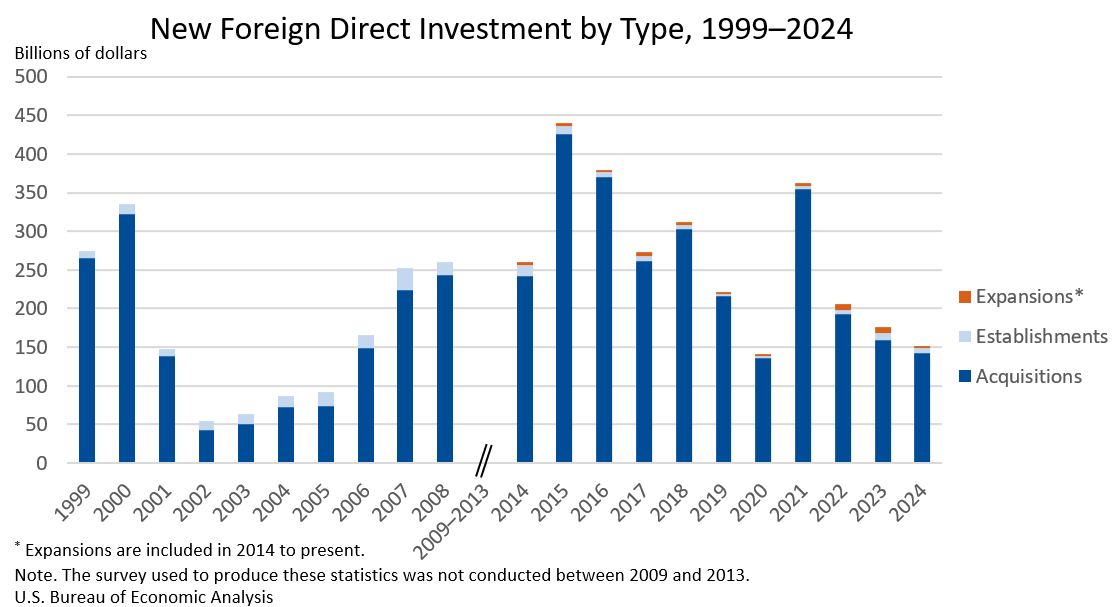Bureau of Economic Analysis
New Foreign Direct Investment in the United States, 2024
Expenditures by foreign direct investors to acquire, establish, or expand U.S. businesses totaled $151.0 billion in 2024, according to preliminary statistics released today by the U.S. Bureau of Economic Analysis. Expenditures decreased $24.9 billion, or 14.2 percent, from $176.0 billion (revised) in 2023 and were below the annual average of $277.2 billion for 2014–2023. As in previous years, acquisitions of existing U.S. businesses accounted for most of the expenditures.
Principal Federal Economic Indicators
Noteworthy
- 2025 News Release Schedule
- Innovation at BEA
- 2025 Annual Updates
- New! Services Trade Data for More Countries
- Data Tool: Trade in Value Added
- Distribution of State Personal Income
- Updated: RIMS II Regional Multipliers
- Arts and Culture
- Space Economy
- FDI Now in State BEARFACTS
- Quick Guide: Price Indexes
The Latest
Gross Domestic Product, First Quarter 2021
Real gross domestic product increased at an annual rate of 6.4 percent in the first quarter of 2021, reflecting the continued economic recovery, reopening of establishments, and continued government response related to the COVID-19 pandemic. In the first quarter, government assistance payments, such as direct economic impact payments, expanded unemployment benefits, and Paycheck Protection Program loans, were distributed to households…
Gross Domestic Product, First Quarter 2021 (Advance Estimate)
Real gross domestic product (GDP) increased at an annual rate of 6.4 percent in the first quarter of 2021, reflecting the continued economic recovery, reopening of establishments, and continued government response related to the COVID-19 pandemic. In the first quarter, government assistance payments, such as direct economic impact payments, expanded unemployment benefits, and Paycheck Protection Program loans, were distributed to households and…
New Data on the Sources of Economic Growth
BEA and the Bureau of Labor Statistics have updated and expanded their joint data set showing sources of growth or decline in industries and how those sources affect the U.S. economy overall. New detail was added about the contributions of information technology and other types of capital assets.
U.S. International Trade in Goods and Services, February 2021
The U.S. monthly international trade deficit increased in February 2021 according to the U.S. Bureau of Economic Analysis and the U.S. Census Bureau. The deficit increased from $67.8 billion in January (revised) to $71.1 billion in February, as exports decreased more than imports. The previously published January deficit was $68.2 billion. The goods deficit increased $2.8 billion in February to $88.0 billion. The services surplus decreased $0.5…
February 2021 Trade Gap is $71.1 Billion
The U.S. monthly international trade deficit increased in February 2021 according to the U.S. Bureau of Economic Analysis and the U.S. Census Bureau. The deficit increased from $67.8 billion in January (revised) to $71.1 billion in February, as exports decreased more than imports. The previously published January deficit was $68.2 billion. The goods deficit increased $2.8 billion in February to $88.0 billion. The services surplus decreased $0…
Gross Domestic Product for the CNMI, 2019
The estimates of GDP for the CNMI show that real GDP—GDP adjusted to remove price changes—decreased 11.2 percent in 2019 after decreasing 19.3 percent in 2018 (table 1.3).
Gross Domestic Product for the CNMI, 2019
Today, the Bureau of Economic Analysis (BEA) is releasing estimates of gross domestic product (GDP) for the Commonwealth of the Northern Mariana Islands (CNMI) for 2019, in addition to estimates of GDP by industry and compensation by industry for 2018. These estimates were developed under the Statistical Improvement Program funded by the Office of Insular Affairs (OIA) of the U.S. Department of the Interior.
U.S. International Investment Position Fourth Quarter 2020
The U.S. net international investment position, the difference between U.S. residents’ foreign financial assets and liabilities, was –$14.09 trillion at the end of the fourth quarter of 2020, according to statistics released by the U.S. Bureau of Economic Analysis (BEA). Assets totaled $32.16 trillion and liabilities were $46.25 trillion. At the end of the third quarter, the net investment position was –$13.86 trillion.
U.S. International Investment Position, Fourth Quarter and Year 2020
The U.S. net international investment position, the difference between U.S. residents’ foreign financial assets and liabilities, was –$14.09 trillion at the end of the fourth quarter of 2020, according to statistics released by the U.S. Bureau of Economic Analysis (BEA). Assets totaled $32.16 trillion and liabilities were $46.25 trillion. At the end of the third quarter, the net investment position was –$13.86 trillion.
Arts and Cultural Production Satellite Account, U.S. and States
The Arts and Cultural Production Satellite Account released today by the U.S. Bureau of Economic Analysis (BEA) shows that arts and cultural economic activity, adjusted for inflation, increased 3.7 percent in 2019 after increasing 2.3 percent in 2018. Arts and cultural economic activity accounted for 4.3 percent, or $919.7 billion, of current-dollar gross domestic product (GDP), in 2019.




